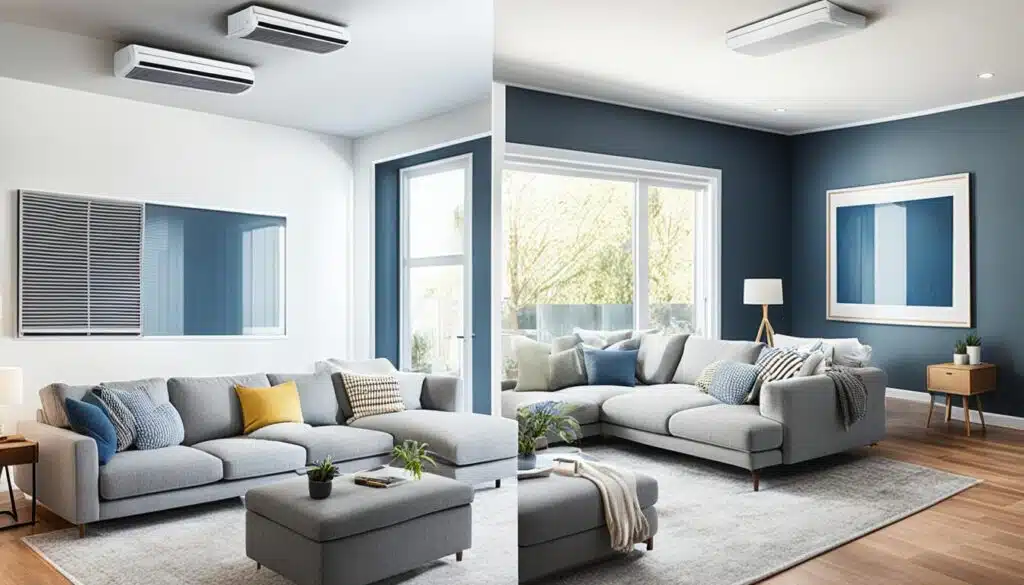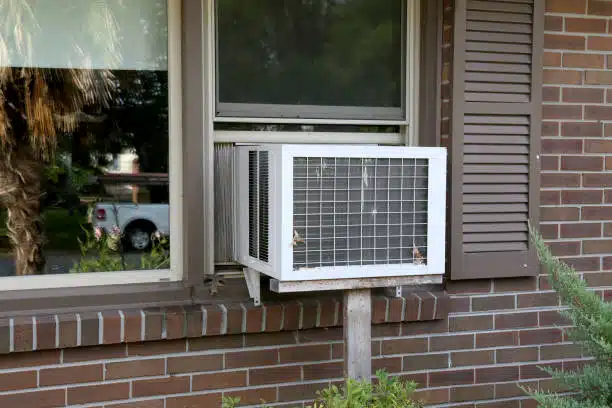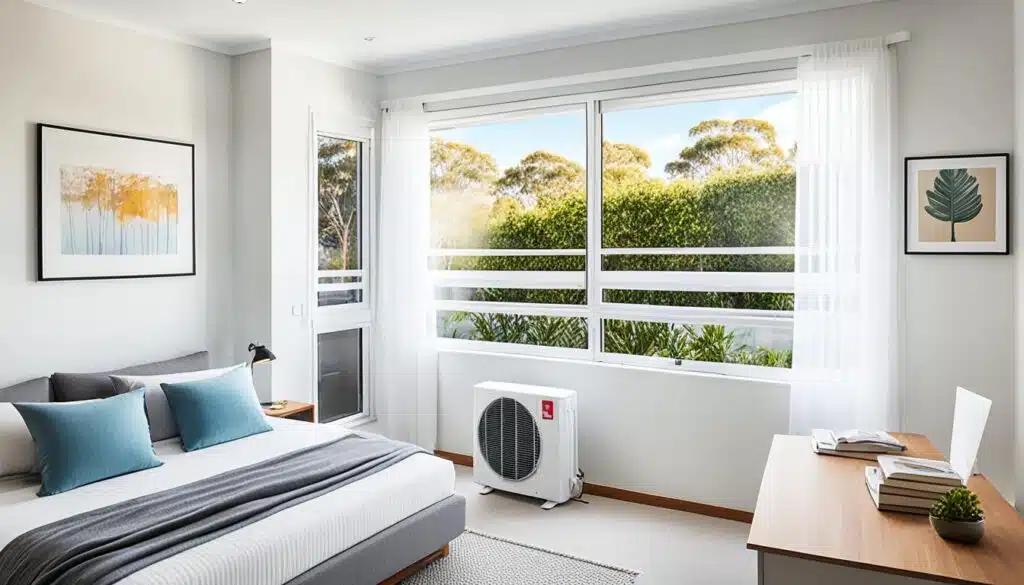Ever wondered why your air conditioner uses so much energy in the Australian summer? It’s because it’s one of the biggest users of your power. Learning how to make your air conditioner more efficient can cut your bills. By using your HVAC system better, you could save money and still stay cool indoors.
Most Australians spend a lot of time indoors when it’s hot. Making smart choices can lead to big savings. For example, choosing an energy-saving model like Daikin’s Alira X can help. It has inverter technology and a top energy rating.
Small changes like adjusting your thermostat can also make a difference. Keeping your air filters clean and sealing gaps around doors and windows helps too. These steps can reduce how much energy you use.
Let’s look at ways to make your air conditioner more efficient. We’ll see how to save money and stay comfortable at the same time!
Understanding the Cost of Running Your Air Conditioning Unit
The cost of running an air conditioning unit is a big part of household bills. In Australian homes, air conditioning uses about 40% of the energy. This shows how crucial it is to know how these systems work.
Annual costs vary a lot, from $150 for small units to over $1,160 for big ones. This depends on how much power they use and how often they’re on.
Things like where you live, how well your house is insulated, and the outside temperature affect costs. For example, cooling a small room in Melbourne costs about $30. But in Brisbane, it can be up to $155. Heating costs also change, from $18 in Darwin to $528 in Hobart for the same room size.
Regular upkeep, like cleaning or replacing filters, can cut energy use by 5-15%. This means big savings over time.
Setting the thermostat at 25 degrees instead of 16 can also cut energy use a lot. Clearing blockages from outdoor units can boost performance by 50% on hot days. Choosing energy-efficient units with inverter compressors can save money in the long run. Making smart choices is key to managing energy use well.
Choosing an Energy-Efficient Air Conditioning Unit
Choosing an energy-efficient air conditioning unit is key to saving money over time and staying comfortable. The Zoned Energy Rating Label (ZERL) helps us pick units that work well in different Australian climates. It shows how well a unit cools and heats, using Energy Star ratings.
In Australia, all home air conditioners must meet certain energy standards. Units made after April 2020 have the ZERL, showing how efficient they are. Units with more stars use less energy, which means lower bills. Bills for electricity can be about 40% of what we spend at home.
When picking a unit, think about what you need for heating and cooling in your space. Spaces can be small or very large, and the right unit size is important. A unit that’s too big or too small won’t work well and uses more energy.
Adding features like sensors or Wi-Fi control can make your unit work better. Inverter technology changes the unit’s power based on the temperature, saving energy. Prices vary, with split-systems costing between $600 and $5500, and ducted systems start at about $9000 fully installed.
The Importance of Proper AC Installation
Getting your AC installed right is key to its performance and saving energy. When done correctly, AC units work better and last longer, cutting down on costs. It’s vital to hire a pro to follow best practices and meet standards. This approach boosts your AC system’s benefits.
Hiring a Professional Installer
Trying to install an AC yourself might save money at first, but it can cause problems later. A pro installer knows how to handle refrigerants and electrical parts safely, lowering the chance of future issues. They check your home’s cooling needs to pick the right system. This choice can lead to lower service costs and a longer-lasting unit.
Placement Considerations for Optimal Efficiency
Where you put the indoor and outdoor AC units is crucial for efficiency. Indoor units should be placed to ensure good airflow. This helps cool the space evenly and stops the system from working too hard. The outdoor unit should be in a spot with good airflow to keep it cool and efficient.
Keeping the outdoor unit away from extreme heat helps it work better and saves energy. This means you pay less on bills and stay cool and comfortable at home.
Understanding Your HVAC System
Knowing how your HVAC system works is key to making it work better. It’s important to understand the main parts like air return systems, compressors, and ductwork. This knowledge helps you make smart choices about upkeep and upgrades.
Checking the system regularly and fixing any leaks in the ducts can help your air conditioner work better. This makes your home or office cooler and more comfortable.
For both homes and businesses, a well-run HVAC system cuts down on energy use and makes people more comfortable. Using ductless mini-splits connects one compressor to several air units, making things easier to manage. Also, new refrigerants like R410A are better for the planet, offering greener heating and cooling options.
Knowing about different HVAC setups like packaged systems or hydronic heating is crucial. It helps you balance heating, ventilation, and air conditioning right. This way, you can keep your place comfy and save on energy at the same time.
Setting the Ideal Thermostat Temperature
Finding the right thermostat temperature is key to saving energy and staying comfortable at home. In summer, set it to 25-27 degrees Celsius to cut cooling costs. Energy Star says this range keeps you cool and saves energy.
When it’s cold, try 18-20 degrees Celsius. This helps lower heating bills and keeps your home warm and cosy.
Seasonal Temperature Adjustments
Adjusting your thermostat with the seasons can save a lot on energy bills. Keep it at 28-29 degrees Celsius when you’re out in summer. In winter, go for 13-15 degrees Celsius to save more.
Experts suggest checking and tweaking these settings often. This helps manage heat and humidity for comfort and efficiency.
Benefits of Programmable Thermostats
Programmable thermostats are a smart way to control your home’s climate. They let you set temperatures for different times of the day. This way, you save energy without losing comfort.
These devices adjust automatically when you’re not home or when you’re busy. This keeps your home at the perfect temperature while using less energy. Using them helps you live more sustainably.
Regular Maintenance for Your Air Conditioning Unit
Keeping your air conditioning unit in good shape is key to its long life and efficiency. It boosts performance and cuts down on energy use. A simple way to keep your AC running well is by cleaning or replacing filters regularly. This can save you 5% to 15% on energy bills by making sure the air flows well and the system doesn’t work too hard.
Importance of Cleaning or Replacing Filters
Cleaning your filters every month or every two months in the cooling season is a must. If filters get too dirty, they block airflow, making it hard for the unit to cool the space. Dirty coils also make the system less efficient, using more energy. It’s important to keep condenser coils clean as they can get dusty. Dust on coils reduces airflow and hurts the system’s performance.
Scheduling Professional Maintenance Checks
Along with regular upkeep by you, getting a pro to check your AC is a smart move. A skilled technician can spot and fix complex issues that are hard to find on your own. These checks help avoid problems that could make your energy bills go up. Companies like ActronAir are great at keeping cooling systems running well in different climates.
Utilising Ductwork for Efficiency
Efficient ductwork is key to making air conditioning units work better. It helps save energy and improves the air we breathe inside. Fixing leaks and blockages makes sure the system works perfectly.
Inspecting for Leaks and Blockages
Checking ductwork for leaks and blockages is a must for top performance. Leaks can waste a lot of money on heating and cooling. Sealing and insulating ducts save energy and cut costs.
A simple test can check if air moves well through the home. This ensures air flows properly everywhere.
Insulating Ducts for Improved Performance
Insulating ducts help keep energy from escaping. Ducts inside conditioned spaces work best, saving a lot of energy and money. But ducts in basements or unventilated areas might not work as well.
It’s best to get experts to seal and insulate ducts. This stops energy waste and makes the air cleaner in our homes.
Improving Your Home’s Insulation and Air Quality
Improving your home’s insulation is key to better energy efficiency and cleaner air. Sealing gaps in windows, doors, and walls keeps your home comfortable. This stops cool air from escaping and hot air from getting in.
This not only cuts down on energy bills but also keeps pollutants out of your home.
Sealing Gaps and Cracks
Sealing gaps makes your home more insulated against outdoor pollutants like dust and pollen. Check windows, doors, and openings often to keep them sealed. Using weatherstripping or caulking can fill small gaps, boosting energy efficiency.
A well-sealed home uses less air conditioning, saving on energy costs and improving air quality.
Investing in Insulation Upgrades
Choosing top-notch insulation materials boosts energy efficiency and indoor health. Materials like Glasswool and Polyester Insulation are great because they’re low in allergens and made from recycled stuff. They control humidity, stop moisture and mould, and keep the air clean.
Maximising Energy Efficiency in Summer
Getting the most out of energy efficiency in summer is key to cutting cooling costs and helping the environment. Using ceiling fans and natural ventilation can make homes more comfortable and use less air conditioning. These methods help with cooling and support eco-friendly living in Australian homes.
Utilising Ceiling Fans and Natural Ventilation
Ceiling fans are great for any home to boost natural ventilation. They move cool air around a room, easing the load on air conditioners. Setting the AC a bit higher, above 25.5 degrees Celsius, can save about $8 per degree on a $100 bill.
Also, closing doors to rooms with AC keeps those areas cool and saves energy. This way, you stay comfy without wasting energy.
Strategic Shading Techniques
Shading can make air conditioning work better. Simple steps like closing curtains or adding awnings block out the sun’s heat. This keeps your home cooler inside.
Using double-glazed windows or weatherproofing also helps keep the temperature right. With good insulation and higher thermostat settings, you’ll use less energy in summer.
Reducing Energy Consumption During Off-Peak Hours
Using air conditioning during off-peak hours can cut down on energy use. This means running AC units when electricity costs are lower. For example, using Economy Tariff 33 can save money by using energy for 18 hours a day outside peak times.
Running AC in the early morning or late evening keeps your home cool without high bills. This smart use of energy helps the environment too. Every degree of extra cooling can increase your bill by 5% to 10%. So, keeping your AC at 22ºC to 27ºC in summer saves energy.
Brands like Hitachi and Midea offer smart features that save energy by adjusting to how many people are at home. Using these smart systems with off-peak energy rates can cut your bills and help the planet. Programming your AC to work mainly during off-peak hours can greatly reduce energy use, saving you money and helping the environment.
Investing in Smart Home Technologies
Smart home technologies change how we handle energy use at home. Smart thermostats are a key feature, offering precise temperature control for each person’s needs. They adjust the temperature based on whether you’re home or not, saving energy.
This automation leads to big cuts in energy bills. It makes managing your home’s temperature easy and efficient.
Benefits of Smart Thermostats
Smart thermostats are key to modernising how we control the temperature at home. They give insights into how much energy we use and let us change settings from our phones. This makes life easier and helps air conditioning work better without wasting energy.
Studies show they can cut cooling costs, especially with energy-efficient air conditioners. They track how we use energy, helping us make better choices.
Automation for Temperature Control
Automation in smart homes goes beyond just setting temperatures. With occupancy sensors, it adjusts heating and cooling based on who’s in the room. This means we stay comfortable while saving energy.
It gives us control over our energy use. With features like scheduling and real-time updates, we can keep our living sustainable. This automation helps lower energy bills and supports a greener future.
Conclusion
To save on your air conditioning unit, you need to do a few key things. First, pick energy-efficient models. Then, make sure they’re installed right. And don’t forget to keep them serviced regularly.
In Australia, many people rely on air conditioning. By making the most of these systems, you can save a lot of money and use less energy. This is good for the planet and your wallet.
Homeowners should think about how to save money with their HVAC systems. Knowing the best temperature to keep your home at, between 20°C to 22°C, helps a lot. Using smart tech, like the TCL FreshIN Series air conditioner, can also improve air quality and control humidity.
Regular maintenance and being mindful of energy use are key to saving money and living sustainably in Australia. By focusing on these areas, we can make our homes healthier and more comfortable. This approach supports our well-being and the environment.







